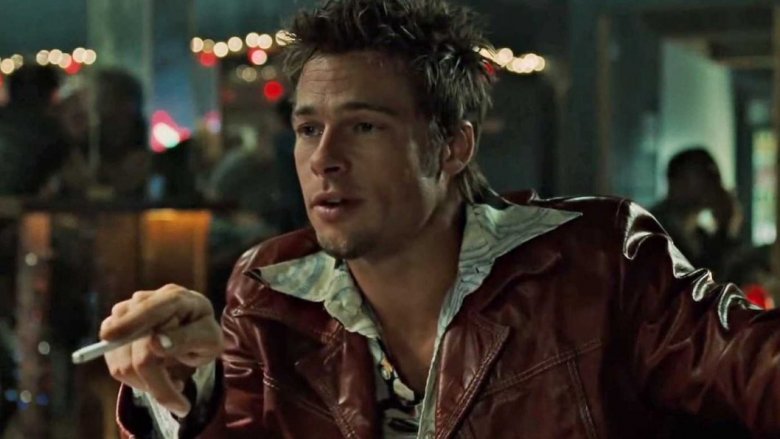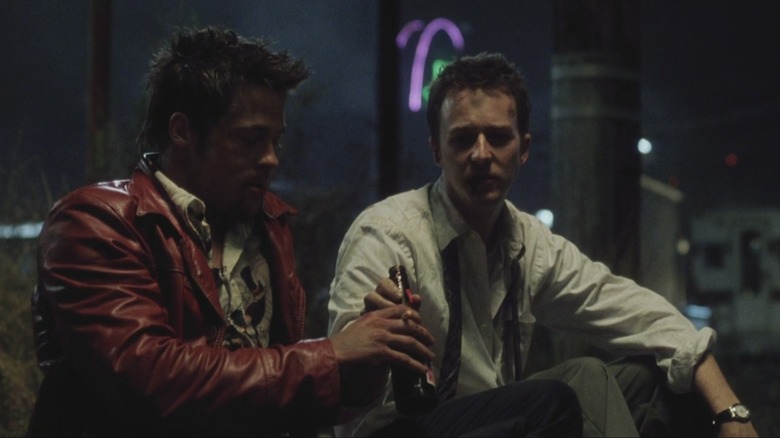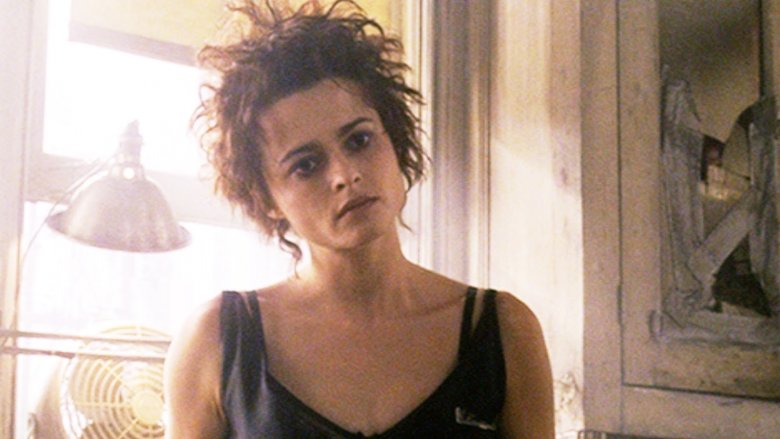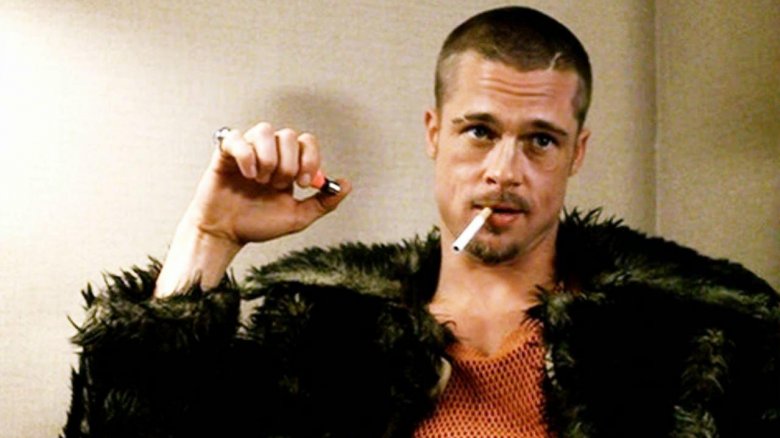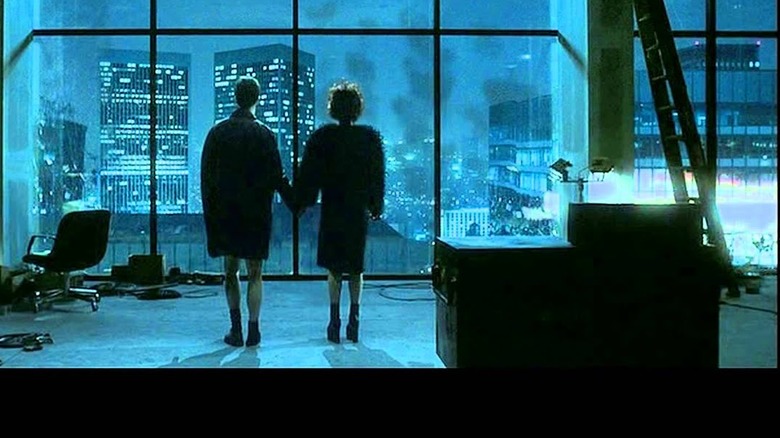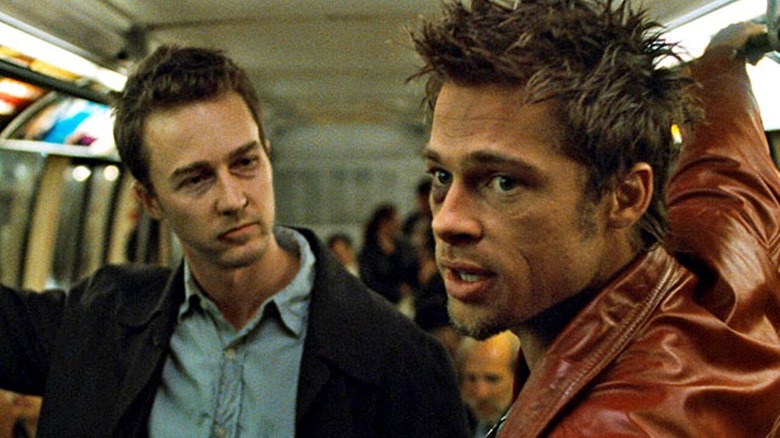The Bizarre Ending Of Fight Club Explained
Let's be honest: we've all known the rules of Fight Club for nearly twenty years. (We're breaking numbers one and two right now! Ooooh, we're so naughty.) But despite being practically old enough to be considered a classic, Fight Club has not become less enigmatic with the passage of time—and especially not its ending. David Fincher's 1999 psychological thriller wrapped up with a big dang twist, followed closely by a big dang bang designed to leave its audience reeling and not a little confused. But if that's you, we've got you covered with this in-depth explanation of Fight Club's denouement. Spoilers ahead, obviously.
Who, or what, is Tyler Durden?
If you've ever had a late-night fantasy about Brad Pitt that got just a little out of hand (and c'mon, who among us hasn't?), then you're already halfway to understanding how the nameless, sleepless Narrator played by Edward Norton managed to first invent and then become the legend known as Tyler Durden. Tyler isn't real; he's the human embodiment of a frustrated corporate consumerist drone's desperate yearning to opt out of—if not utterly destroy—the system.
If Fight Club were shot from a third-person perspective, it would be the story of a mentally unbalanced man leading a bizarre double life as an office worker by day and a charismatic cult leader by night, battling the dark impulses that he eventually succumbs to. But thanks to the movie's entirely unreliable first-person narrative, we see Tyler like the Narrator sees Tyler, as a charming, red leather-jacket-clad nihilist whose whole schtick is totally #lifegoals. To quote the man himself, "All the ways you wish you could be, that's me. I look like you wanna look, I f*** like you wanna f***, I am smart, capable, and most importantly, I am free in all the ways that you are not."
Tyler refers to himself at one point as the Narrator's "imaginary friend"—but really, he's more like a hallucinatory hitman, hired by the protagonist's subconscious to blow up his life...and a few other things.
Nobody knows that they saw it, but they did
Fight Club doesn't tip its hand much when it comes to foreshadowing its big twist, but Tyler Durden actually appears on four separate occasions before we ever really meet him—in the form of a single-frame blip on the screen. On re-watch, these moments are obvious proof that Tyler isn't a real person. But in a movie that makes such pointed statements about consumerism and human manipulability, it's also no coincidence that our first glimpse of Tyler comes in the form of a subliminal message. By the time he makes his grand entrance as the Narrator's airplane seatmate, you kinda feel like you know him.
What's the deal with the car scene?
One of Fight Club's niftier sleights of hand is that despite being the film's two central characters, Tyler and the Narrator almost never interact with each other in front of anyone else. But one notable exception is a moment that takes place about two thirds of the way through, when they're in a car crash along with two other members of Project Mayhem.
On first watch, this scene seems like a couple's spat of sorts between the Narrator and Tyler, with the Mechanic and Steph playing the part of a bizarre Greek chorus in the background. But if you delete the Narrator's half of the dialogue, the scene still totally works as an illustration of indoctrination-in-action. Also, watch closely at the end and notice that Tyler, who was behind the wheel, emerges after the crash from the passenger side of the car—and pulls the Narrator from the driver's seat.
Why did Marla stick around?
As far as the Narrator is concerned, Marla is a nuisance and an interloper whose noisy sexual relationship with Tyler keeps him awake all night. But from Marla's point of view, the Narrator and Tyler are one and the same—which actually goes a long way toward explaining why she continues to maintain a relationship with him.
The Tyler Durden Marla knows is moody, emotionally unavailable, and kind of a jerk to her; "You love me, you hate me. You show me your sensitive side, then you turn into a total asshole," she snaps. But at the same time, that line could just as easily describe any number of guys who aren't suffering from literal split personality disorder. As far as Marla is concerned, Tyler is a perfectly ordinary breed of bad boyfriend—and one who's good enough in bed to be worth the continued emotional investment.
Is Tyler dead?
In the final moments of Fight Club, the Narrator sticks a gun in his mouth and pulls the trigger—but it's Tyler Durden who falls to the floor with his brains leaking out the back of his head. Why? The answer may lie in Tyler's own explanation of why and how the Narrator created him: "I am free in all the ways you are not." But who's freer than a guy willing to cut the cord that tethers him to life itself?
In the moment he pulls the trigger, the Narrator both takes and surrenders control simultaneously; he lets go in every sense of the word. And while he doesn't die in that moment, his life as he knows it is arguably over—and he's arguably reborn in the next scene, taking Marla's hand and watching calmly as Project Mayhem reaches its inevitable conclusion.
More food for thought: considering that members of Project Mayhem who give their lives to the cause are rewarded with the privilege of having names, and considering that the nameless Narrator was both the project's founder and its first unwitting member, we wouldn't be surprised if he goes by "Tyler Durden" moving forward.
What happens next?
Fight Club ends just as Project Mayhem detonates the bombs in the basements of multiple buildings where credit records are held—an achievement which Tyler and his followers believed would launch the start of a new era of "financial equilibrium." ("If you erase the debt record, we all go back to zero," the Narrator says, describing the plan to the police. "It'll create total chaos.") But is this mission accomplished, or is it just the beginning?
In an earlier speech, Tyler described a vision of a world rebuilt not just on the ruins of the financial system, but on the actual ruins of civilization as we know it: one where leather-wearing, subsistence-farming survivors of the apocalypse live out their lives surrounded by crumbling, obsolete monuments to consumerism.
Add to that the fact that dozens of independent, anarchist Project Mayhem cells had formed in cities across the US by the time the Narrator gained control of his faculties—all populated by Space Monkeys prepared to risk their lives for a new world—and it's a fair bet that these explosions are merely the opening salvo in an apocalyptic destruct-a-thon designed to permanently dismantle the system.
Does this story have a moral?
Fight Club obviously has a lot to say about the dangers of modern consumer culture—in the form of Tyler Durden's endless Nietzschean lectures about the inevitability of death and the pointlessness of ladder-climbing. "Advertising has us chasing cars and clothes, working jobs we hate so we can buy s**t we don't need," he says. But while Tyler's nihilism is never in doubt, the movie's message is less obvious.
For one, the Narrator never fully subscribes to that philosophy, even after he puts a bullet in his own head to be rid of Tyler. But for another, Fight Club inadvertently gives its anarchist cult leader an awfully corporate capitalist, all-American work ethic: just look how much you can accomplish if you try hard, believe in yourself, and never, ever sleep!
